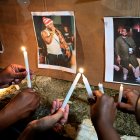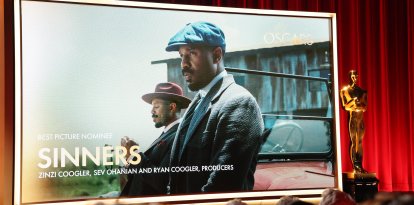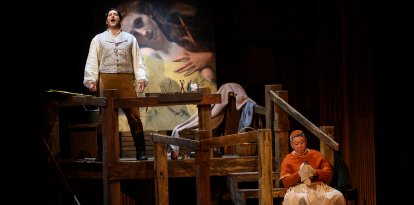'Patria y Vida': The documentary that shows the cruelest side of Cuba's decadent dictatorship
The film recounts the making of a song of the same name and how the dictatorship's persecution was unleashed against the artists who, through their music, started one of the most important movements against the Cuban regime in more than 60 years.

Yotuel Romero and Beatriz Luengo attend the premiere of "Patria y Vida" at Capitol Cinema.
The new documentary "Patria y Vida" illustrates the power of music by recounting how a song of the same was created and how the Cuban dictatorship's persecution was unleashed against the artists behind it. The song started one of the most important movements against the Cuban regime in more than 60 years. The documentary will be available on the big screen starting Oct. 18.
The San Isidro movement led the July 11 protests on the island, which began after the song's release. But, undoubtedly, this demonstration came about thanks to Cubans who decided to raise their voices and say "enough." The documentary shows the story of Yotuel Romero, promoter of the movement, and his colleagues, many still imprisoned by the Cuban dictatorship.
The artists involved in the project include Yotuel Romero, Gente de Zona, Descemer Bueno, El Funky, as well as two young people who are imprisoned on the island due to the dictatorship: Luis Manuel Otero Alcántara and Maykel Osorbo.
In addition, the film shows images that reveal how officials repress and persecute Cubans who protest in favor of freedom.
The filming of what eventually became the documentary began out of fear. This is what Beatriz Luengo, director of the film and Yotuel's wife, acknowledges. Spanish by birth, Luengo decided to accompany her husband in his dream of promoting Cuban freedom through art.
"I don't know the reasons why one day a director decides to pick up a camera and record something that happens in front of their eyes. In our case, it was fear. Someone advised us that filming would protect us. So, 8 months pregnant, I set out to film my husband. And we asked a wonderful cameraman, who they put in jail, to record the San Isidro movement and everyone who was part of the song," Luengo told VOZ during the premiere of the documentary in Madrid, Spain.
The documentary portrays the instant the song was released, when the Cuban dictatorship cut off internet access throughout the island. It also shows the persecution faced by the artists involved in the project and the moment when they began to receive international recognition. Activists such as Luis Manuel Otero Alcántara remain imprisoned, along with more than 1,100 political prisoners on record in Cuba.
As soon as the song was released, they began to see the world's interest and realized that it was something that transcended beyond their story as a family and a team. They realized that what they did helped to put the situation in Cuba in context.
For the director, the documentary goes beyond a production that shows the reality of persecution in Cuba. For her, she says, it is an embrace, and her main motivation is to see the yearning in her husband's eyes for his island to be free, a dream he shares with millions of Cubans.
"I see in his eyes how he dreams of taking our children to Cuba. And there are millions of Cubans like him. ... The focus of this film is to tell the story of my husband. We got married and promised each other that what was his was mine and what was mine was his. That formula also included pain," said Luengo.
'We all ache for Cuba'
Meanwhile, for Yotuel Romero, the documentary reflects a reality that he had to live and that he wants other Cuban children not to. His story is that of a child with a broken childhood. His father emigrated from Cuba, and after a year, he lost all contact. The reason was because if the Cuban regime discovered that he was in communication with his father, they could have taken custody of him away from his mother.
Now, Romero is fighting for Cuban children to be able to grow up in a free country where they don't have to emigrate to dream. Romero's greatest fear is not to return to Cuba, as happened to international singer Celia Cruz. The documentary also features other well-known artists such as Emilio and Gloria Estefan, who tell how the dictatorship tried to make many Cubans believe that they were of another nationality as a way to make their international career invisible.
"We all ache for Cuba. We all know the reality of Cuba and we all know that what Cubans tell us, between whispers, is that this is over and the desire to be free. A picture is worth a thousand words. I have to thank my son, and I will tell him how my mother used to tell me: 'Son, never be afraid to do good. Even if it costs you, even if it is sometimes scary; you must always do good.' What has been done with this documentary is the best good that can be done for the Cuban people," said Romero.
The rapper insisted that Cubans are very brave and that they need the world to listen to them because the only thing they ask for is to have "Patria y Vida" (homeland and life).
"[Cubans are] a people with a lot of fear, but a people that on July 11 said, 'Enough. It's over.' This documentary is dedicated to those people, to all the people who have put their freedom in commitment for the people's struggle. I just want the world to be able to see it and to see the courage of those people. And that if they were able to do it one day, I know that they will get up again and I know that they will fight again until the end and achieve what all Cubans want: to be free."


























